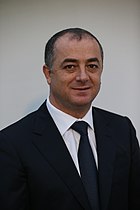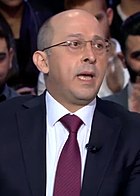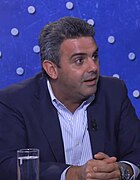|
2022 Speaker of the Lebanese Parliament election
The 2022 Speaker of the Lebanese Parliament election was an election to elect the speaker of the 24th Lebanese Parliament.[1] It was 7th legislative speaker election since the implementation of the Taif Agreement in 1989. Nabih Berri won with 65 votes out of 128, the minimum needed for a majority and the lowest outcome in his 30-year tenure as the speaker of parliament.[2] Background2022 general electionThe 2022 general election was held in the wake of the revolution of 17 October 2019, a series of large-scale anti-government demonstrations against the stagnation of the economy, unemployment, Lebanon's sectarian and hereditary political system, corruption, and the government's inability to provide essential services such as water, electricity and sanitation.[3] Despite the ensuing resignation of Prime Minister Saad Hariri[4] and his replacement by Hassan Diab[5], the country's economic situation continued to deteriorate. Compounding the crisis, on 4 August 2020, several thousand tons of ammonium nitrate stored in a hangar in the Port of Beirut exploded, killing 218, injuring over 7,000[6], leaving 300,000 homeless[7], and resulting in damages estimated at nearly four billion euros. In the elections held on 15 May 2022, Hezbollah and its allies lost their parliamentary majority. Among the Christian community, anti-Hezbollah Lebanese Forces supplanted the Free Patriotic Movement as the largest party. The main Sunni party, the Future Movement, had withdrawn from the election, resulting in more fragmented representation for the community. Pro-reform groups that had emerged from the 2019 protests secured 13 seats. Election processNational PactAccess to the parliamentary speakership is subject to an informal agreement known as the National Pact. Agreed in 1943, the latter limits this office only to members of the Shia Islam faith.[8] The National Pact is based on an unwritten agreement concluded in 1943 between the Maronite Christian president Bechara El Khoury and his Sunni prime minister Riad Al Solh when Lebanon gained independence from France. The pact stipulates that the president of the Republic must be a Maronite Christian, the prime minister a Sunni Muslim and the Speaker of parliament a Shiite Muslim.[9] Round
Deputy speaker of the Lebanese Parliament election
The Deputy speaker of the parliament was elected immediately after the speaker.[10] Access to the deputy speakership is subject to an informal agreement known as the National Pact. Agreed in 1943, the latter limits this office only to members of the Greek Orthodoxy faith.[8] Potential candidates
RoundsIn the first round, the legislators failed to elect a candidate with over 65 votes for a majority.[13] The second round, parliament managed to elect former defense minister, Elias Bou Saab of the Free Patriotic Movement, with 65 votes.[13]
Secretaries of the Parliament election
The 2 secretaries of parliament were elected immediately after the Deputy Speaker. Although not constitutionally required, it was decided that the secretaries would be attributed to one Maronite Christian and one Druze. The election process of the 2 deputies had large debate particularly by opposition MPs. It was suggested that each MP votes for both preferences in the same ballot. However, it was decided that voting would take place on the basis of one name per ballot.[14] As a result of this Firas Hamdan, an opposition MP, who was one of few candidates for the Druze secretary, withdrew his candidacy in protest of the sectarian electoral procedure.[14] Rounds
See alsoReferences
|
|||||||||||||||||||||||||||||||||||||||||||||||||||||||||||||||||||||||||||||||||||||||||||||||||||||||||||||||||||||||||||||||||||||||||||||||||||||||||||||||||||||||||||||||||||||



